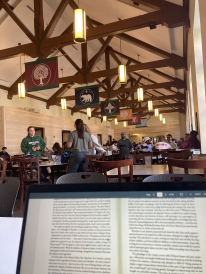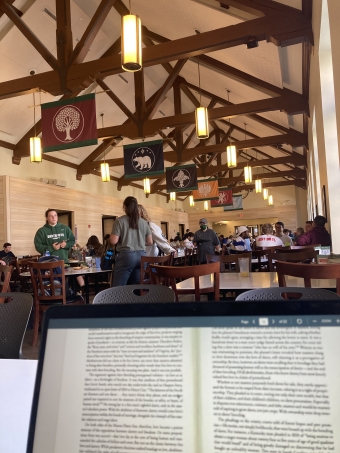

Alex Campbell

You are here

The Terrifying Transition to College Writing (or the Story of my First College Paper)
At some point during your senior year of high school, your English teacher will start waxing poetic about getting your writing "up to a college level." And if they don't, you'll hear about it during the college search. And if not then, you'll hear about it when you've chosen your school and they're emailing you about the resources available during your college transition to help elevate your writing to the daunting, elusive college standard. Regardless of how and when, if you've encountered this concept of the "transition to college writing," it might have worried you, or even made you question whether your writing will be good enough.
And trust me, it won't.
I'm kidding. It's really not a big deal, and Dartmouth provides you with all the resources you will need to succeed. And I promise, it's much less intimidating than everyone will make it seem.
Dartmouth's first response to this terrifying transition is a first-year writing requirement. This can be fulfilled through three different course options: Writing 2-3, Writing 5, or Humanities 1 & 2. I won't go into detail about the differences, but you can find that information here. I, for one, am taking a Writing 5 course called The Irish Short Story: Re-imagining & Reinventing Ireland.
Making a good first impression is a daunting task anywhere, and in a writing class it all feels tied to The First Essay. I was worried, mostly because of the idea that "college-level writing" would be difficult to obtain. However, throughout the process of writing this First Essay, I utilized several different resources and was able to write a final product I was proud of. In an attempt to demystify the process of "college writing," outlined here are some of the resources I used to help me!
In-Class Peer Editing
No matter which course you take, the writing courses are designed for you and your peers to learn how to write more effectively: and that includes learning from each other. In my class, we had two rounds of peer-editing that coincided with our first two rough drafts. Both rounds were incredibly helpful because my classmates were all familiar with the texts I was writing about and were thus able to critique my writing for both content and clarity.
Outside-of-Class Peer Editors
After my first drafts, I had two friends outside of my class read my paper. Even though they hadn't read the stories I was writing about, they were able to help by reading for grammatical errors, and pointing out areas where I could declutter my phrasing or syntax.

Office Hours
Every professor at Dartmouth is required to hold office hours – and what better time to drop in than while writing an essay? And for what better reason than to tackle that age-old question: have I achieved college-level writing? Turns out, the answer was yes! My professor was both kind and helpful: he complimented my writing while also helping me flesh out my ideas more. I left feeling much more confident in my paper.
RWIT – Dartmouth's Peer Writing Center
RWIT is the writing center located in Baker-Berry Library, and has great resources to help students with their writing. I scheduled an appointment with a peer tutor to help me with the final touches on my paper, and I'm really glad I did. They helped me fine tune some things to make my writing more clear and effective, and again, I left feeling much better about my essay than I had when I walked in!
The RWIT center can do a lot more than help you fine tune a paper in its final stages though – you can find out more about what they can help with at their website here.
By the time the due date came, I felt really confident in my essay, largely in part because of the resources I was able to take advantage of. I already feel far less intimidated by my next paper, knowing that I always have options to help me improve my writing. So when you are here at Dartmouth, don't be afraid to use these same resources I have! Whether it's friends, classmates, professors, or designated peer writing tutors, all of these can help you elevate your writing to the (not in fact elusive but instead very achievable) "college level."
Posts You Might Like

Read more about the Phil 1.08 Philosophy of Time and Time Travel class!


Spending my summer off term getting my CNA license in Boston!


Ciao Bella! Let me explain how I am completing the Dartmouth language requirement one row at a time.


Read more about the Ling 1 Introductory Linguistics class!


Read more about the Spanish 9 Advanced Culture and Conversation class!


Come learn about the classes I'm taking this summer!


My time at the MFA, completely free of charge!


At Dartmouth, students have the opportunity to fuse two different academic studies and programs into a single major. Learn more about my modified major here!


A look into my class Italian 85: Independent Reading and Research, focused on Italian Fascism.
